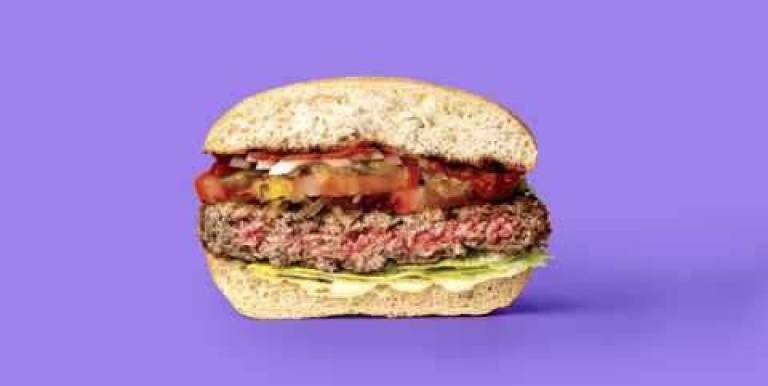Hamburger vs. veggie burger

An over-salted imitation
The Impossible Burger is the first vegan burger to boast a real beef flavor and eating experience while simultaneously saving the planet.
My main concern as a dietitian is whether this new product is a healthier option than a good old hamburger. The Impossible Burger is comparable in terms of macronutrients to a beef burger. Both have around 20 grams of protein and 15 grams of fat. The protein in the Impossible Burger comes from mainly wheat, potato, and some soy, making it a no-go for those with celiac disease or allergies to wheat or soy. The iron content is also comparable, and the vegan burger has vitamin C added, which enhances absorption; but the same effect is seen when adding tomato to a plain ol’ hamburger.
Most concerning is the Impossible Burger’s sodium content. As commonly seen in processed foods, it has about seven times more salt than its beef counterpart.
The fat source for the Impossible Burger is coconut oil. While coconut oil has become increasingly popular, some of the notoriety regarding its healthfulness may be unfounded. Coconut oil is still a saturated fat, which means it is solid at room temperature. Coconut oil has shown to be hypercholesterolemic, raising both LDL “bad” and HDL “good” cholesterol. The saturated fat in red meat has similar components to olive oil, which has not demonstrated increased cholesterol levels.
As for the sustainability claims of the Impossible Burger: Cattle are ruminant animals, able to digest and obtain nutrients from substances that can’t digest (like grass) or don’t eat (like out of date fruits and vegetables and distiller’s grain). They generally aren’t too picky when it comes to their diet, making them rather sustainable from a farming perspective. Cattle can turn this “inedible” material and “food waste” into high-quality protein and essential micronutrients. We already have an efficient method of making meat with a “real beef flavor” from plants.
Impossible Foods has worked hard to imitate the process, extracting DNA from the roots of soy plants and inserting it into a genetically engineered yeast, which is then fermented to create soy leghemoglobin. But from where I stand, it’s a pale imitation, with a lot more salt.
Sarah Griffin is a registered dietitian and has a master’s of science in nutrition